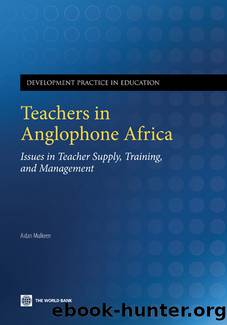Teachers in Anglophone Africa by Aidan Mulkeen

Author:Aidan Mulkeen [Mulkeen, Aidan]
Language: eng
Format: epub
ISBN: 978-0-8213-8053-6
Publisher: THE WORLD BANK
Published: 2010-08-15T00:00:00+00:00
IN-SERVICE CONTINUING PROFESSIONAL DEVELOPMENT AND SUPPORT SYSTEMS
Internationally, professional development is increasingly seen as a continuum throughout the career of a teacher (OECD 2005, UIS, 2006). In this view, teachers do not emerge from their initial training with a full range of skills, but develop and refresh their skills throughout their careers. Provision of continuous professional development (CPD) opportunities for in-service teachers plays an important role in improving teacher quality by providing opportunities to refresh knowledge, to update on new curricula, and to reflect on professional experiences. In low-income countries where the quality of entry may be lower than desirable, the value of such CPD supports for teachers may be even greater.
Although most of the case-study countries had some form of CPD provision, the scale and coverage of CPD provision was quite limited, as much of the focus of in-service training was on provision of initial qualifications to unqualified teachers. In most of the countries, government provision of CPD was supplemented by a significant volume of short courses provided through donor projects and NGOs, often with limited geographical coverage. In Liberia, almost all of the CPD was provided by NGOs, resulting in very uneven coverage. In most countries the uncoordinated provision of short courses by multiple providers meant that some teachers were exposed to multiple opportunities for training, while others received none. Where teachers were paid a per diem when attending courses, opportunities to attend courses could be valuable sources of additional income, and hence become a form of patronage distributed by officials to favored teachers. Where short courses were held during school time, the uneven distribution of access to courses resulted in multiple absences by some teachers.
Government provision of CPD often involved a combination of short training inputs at local centers, and support visits to individual schools. In Zambia, Malawi, and Uganda, the support service used a network of local centers and much of the CPD was provided at these centers. In Malawi, the primary education advisers (PEA) seemed to spend much of their time at the teacher development centers, and although they had only 12â15 schools each, many were visited only once a year. In The Gambia and Lesotho, the provision of support centered on more mobile support staff (called cluster monitors in The Gambia and district resource teachers (DRTs) in Lesotho) and most of the support, including observation of lessons and provision of feedback and support to individual teachers, was provided at the school level. Both approaches have some merits. Provision of CPD at local centers allows greater coverage, and allows teachers from local schools to meet and share experiences. Support at the level of individual schools provides greater opportunities to observe individual teachers and provide one-on-one support.
In most cases the provision of support for teachers was separate from the inspection or monitoring of teachers. In Lesotho, for example, there was a network of district resource teachers with a mandate to provide support, and a separate network of district inspectors, who were expected to monitor quality. Uganda and Zanzibar had similar separate inspection and support systems.
Download
This site does not store any files on its server. We only index and link to content provided by other sites. Please contact the content providers to delete copyright contents if any and email us, we'll remove relevant links or contents immediately.
| Anthropology | Archaeology |
| Philosophy | Politics & Government |
| Social Sciences | Sociology |
| Women's Studies |
Cecilia; Or, Memoirs of an Heiress — Volume 1 by Fanny Burney(32544)
Cecilia; Or, Memoirs of an Heiress — Volume 2 by Fanny Burney(31942)
Cecilia; Or, Memoirs of an Heiress — Volume 3 by Fanny Burney(31928)
The Great Music City by Andrea Baker(31916)
We're Going to Need More Wine by Gabrielle Union(19033)
All the Missing Girls by Megan Miranda(15945)
Pimp by Iceberg Slim(14484)
Bombshells: Glamour Girls of a Lifetime by Sullivan Steve(14052)
For the Love of Europe by Rick Steves(13899)
Norse Mythology by Gaiman Neil(13345)
Talking to Strangers by Malcolm Gladwell(13345)
Fifty Shades Freed by E L James(13232)
Mindhunter: Inside the FBI's Elite Serial Crime Unit by John E. Douglas & Mark Olshaker(9318)
Crazy Rich Asians by Kevin Kwan(9275)
The Lost Art of Listening by Michael P. Nichols(7489)
Enlightenment Now: The Case for Reason, Science, Humanism, and Progress by Steven Pinker(7306)
The Four Agreements by Don Miguel Ruiz(6744)
Bad Blood by John Carreyrou(6610)
Weapons of Math Destruction by Cathy O'Neil(6264)
